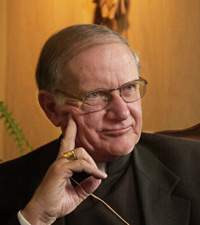But More Can Be Done to Fight Misconduct
News-Leader [Missouri]
March 1, 2006
http://www.news-leader.com/apps/pbcs.dll/article?AID=/20060301/OPINIONS01/603010316/1091
Sexual misconduct.
It's both a painfully specific phrase and vague enough to leave lots of unanswered questions.
Monsignor Stephen Schneider, a Catholic priest who served the Diocese of Springfield-Cape Girardeau for 34 years, has been removed from his position after an investigation into an allegation of sexual misconduct. The priest will not be prosecuted because his actions violated church policy but did not break the law, said Recy Moore, a spokeswoman for the diocese.
Bishop John Leibrecht's handling of this matter shows the Catholic Church has improved its handling of sexual abuse allegations in the wake of the nationwide scandals that have wounded the church.
 |
|
Bishop John Leibrecht News-Leader File Photo |
They have made it as easy as possible for abuse victims to come forward. The promise of anonymity is an important part of that.
The victim and the victim's family would not have come forward if not for the confidentiality.
The church also makes its policy on sexual misconduct readily available on its Web page — www.dioscg.org.
The diocese also has instructions for making a confidential report of sexual abuse in a prominent place on its Web page.
Staff at the Catholic Center are trained to direct someone who wants to make a report.
The diocese paper carries monthly reminders of the policy and how it works.
Survivors of abuse need to know that they will be listened to in a confidential manner and they will not be judged. Because the Catholic Church has worked to create that atmosphere, a victim came forward and the system worked the way it should.
Unfortunately, the bishop could have handled this incident even better.
First, he told a reporter that Schneider admitted to one incident of misconduct and that Leibrecht believed the priest when he said there was only one occurrence. A statement like that by Leibrecht can only serve to discourage other possible victims from coming forward. The bishop said he made up his mind and that the case is closed.
The abuse scandals that hurt the church were caused by bishops who too often believed their priests instead of challenging them, said David Clohessy, national director of the Survivors Network of those Abused by Priests.
Second, the diocese only released limited information about the incident. This is because of the promise the bishop made to the family of "absolute anonymity."
To honor that promise, no information will be released about the victim's sex or age, the parish where the abuse occurred or the year that it happened.
The lack of details is not useful for parents concerned about their children's safety.
Clohessy said that anonymity is a good thing.
However, balancing that with parents' desire for information is a tough act.
The Catholic Church here has done a good job of creating an atmosphere where people feel comfortable coming forward and talking about trusted people in positions of authority who may have done things no one could imagine possible.
Their efforts at reform are commendable, and we hope they continue to refine the process.
Any original material on these pages is copyright © BishopAccountability.org 2004. Reproduce freely with attribution.